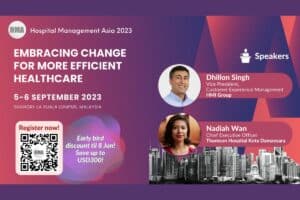Table of Contents
It is now more important than ever to stay on top of the latest advancements in healthcare. AI can help us do just that!
The MEDICA HEALTH IT FORUM is one of the classics in the world-leading trade fair MEDICA’s programme. It started life under the label “MEDICA Informatica” at the beginning of the 90s, as a special show for software for doctors’ practices, and has now become an international meeting point for trendsetters that gives an overarching insight into the future of digitalised medicine. This year’s programme for the English-speaking forum proves this once more.
When MEDICA 2021 is held in Düsseldorf (from 15 to 18 November), it will focus on topics such as “Virtual Care & Digital Therapeutics” or “Medical Artificial Intelligence & Robotics” and “Fields of Innovation”, and even reaching as far as “Societal Aspects of Digitalized Healthcare”.
New this year: In line with the hybrid event concept for MEDICA, the expert panels, tech talks and deep dive sessions can be followed either live on-site (at the forum stage in Hall 12) or live streamed via the industry portal, MEDICA.de, with the appropriate ticket. Anyone who comes to the trade fair in Düsseldorf will also find exhibits on projects from universities and research institutes oriented around the themes in the adjacent exhibition areas.
A significant trend in healthcare IT is influencing user behaviour. This is reflected in the motto of the development team for the MIKA app: “You can do more than just be treated. You can act and decide for yourself”. As the first digital healthcare app (DiGA) for cancer patients, the MIKA app has been adopted into the directory of the German Federal Institute for Drugs and Medical Devices (BfArM).
Dr. Jan Simon Raue, Founder & MD of MIKA, will be one of the first to give a talk at the MEDICA HEALTH IT FORUM on Monday 15 November. Promoting good mental health is one of the objectives. For example, users’ powers of resilience are trained in themed journeys, or aid is given on how to cope with feelings such as fear and loss of control.
Based on findings from behavioural therapy and neuroscience, the digital healthcare company aidhere develops healthcare apps such as zanadio. This is the first app that doctors can prescribe to treat patients that are very overweight, with a BMI of 30 to 40. zanadio is based on effective principles for established conservative obesity therapy and implements these digitally. Based on the data entered, it gives patients personalised recommendations. Dr. Nora Mehl, Co-Founder & Managing Director of aidhere GmbH, will explain this.
Digital drugs: When software stimuli trigger physical reactions
Digital drugs are used to trigger a direct physiological reaction using software-generated medical stimuli alone. This is one of the themes that Flying Health focuses on. Its spin-offs, Dopavision and Neuraltrain, develop digital drugs such as these for short-sightedness and mental health, thus aiming to shape the next generation of healthcare.
In addition, Flying Health works on advancing and implementing future-oriented IT strategies in the three clinics of the Schwester Euthymia Stiftung [Sister Euthymia Foundation]. Lina Behrens, Managing Director of Flying Health, will moderate the session which Monika Rimmele, Head of Digital Transformation for Siemens Healthineers, will also take part in.
People make the final decision
Virtual Triage will be discussed from 4 pm on Monday (15 November). Dr. Dominik von Stillfried, Chairman of the Board for the Central Institute for Healthcare Provided by Statutory Health Insurance (Zi), will give an overview of the current status of their work with SmED (structured medical first assessment in Germany) in his forum speech. This is the name of the software which supports medical specialists in assessing acute healthcare issues in telephone centres for the German service number 116117.
Software alone does not make the decision on the first assessment. Von Stillfried states: “We ensure that people make the decision”. The people in the telephone centres themselves, even, do not give a diagnosis. Instead, they give advice on how the caller can access the appropriate level of care: Is the patient a real emergency, meaning that they may have to ring for an ambulance? Or can the patient take a little time and consult their doctor in the next few days?
Findings dating from one and a half years ago are now available: “Two-thirds of the callers fall into the “as quickly as possible” and “within 24 hours” categories”, states von Stillfried, and goes into further detail: “When a call is made, then there is already a certain need for care”. Von Stillfried adds that the software recommends consulting a hospital for less than a fifth of the patients.
However, most people ring at times when an on-call medical service is quickly available, and, in general, a hospital does not have to be consulted. The hotline 116117 will also be completed with a digital self-assessment this year, which is also based on SmED. Some statutory health insurance associations will then start a test run for this.
A hotline with a smart network humming in the background
Those seeking aid can call up the first assessment software on the 116117 website, get feedback and then decide on whether they need further support or not. If they do, they call 116117 and can then allow the call centre worker to view their assessment using a PIN so that they can receive a detailed care offer. SmED is a neural network that offers over 50 million query options elicited from and to respond to around a hundred combinable symptoms, along with in-depth question-answer combinations.
Ultimately, all options lead to nine final decisions, which result from a combination of the levels of urgency and the care required. SmED does not use any artificial intelligence in order to draw conclusions from the questions, and it does not, under any circumstances, replace a diagnosis from a doctor. In any case, if the lack of doctors continues to rise, and good experiences are had with SmED, then, in suitable cases, it could be recommended as an aid that people can first use themselves instead of visiting the doctor.
Conclusions from the pandemic for virtual healthcare in the future
Naturally, the COVID-2 pandemic, and above all the period after it, will be discussed. Even after the pandemic, a return to analogue complacency, as was the case before the pandemic, is to be avoided at all costs, warned the Spitzenverband Digitale Gesundheitsversorgung [Central Association for Digital Healthcare] just before the Bundestag elections. Dr. Anne Sophie Geier, CEO of the Spitzenverband Digitale Gesundheitsversorgung, will take part in an expert panel on the future of virtual healthcare in the post-pandemic period at the MEDICA HEALTH IT FORUM on Monday 15 November.
However, the Scientific Council for AOK Nordost established in March this year that after one pandemic, another will come. “We cannot overstate how evident it was that shortfalls on the path to comprehensive digitalisation can cause huge damage, particularly in sectors such as healthcare and educational facilities, but also in general management”, reported the Council. The committee speaker, Inga Bergen, will also appear in the expert panel as a speaker in Düsseldorf on Monday. The panel on virtual healthcare following the pandemic will be led by Dr. Sarah J. Becker from the Institute for Digital Transformation in Healthcare in Witten.
A “Digital Angel” for carers
The Digitaler Engel [Digital Angel] project focuses on carers. An important part of the platform consists of algorithms for detecting stress. These analyse ECG data from carers and derive indicators of stress from these. Using the indicators, the platform is able to assess when a carer is under too much strain and suggest suitable measures via an assistance system. This project was developed at the Fraunhofer Institute for Software and Systems Engineering ISST and will be presented in Düsseldorf by Dr. Sebastian Dries, Department Head for Healthcare, in the forum session on 15 November from 4 pm.
Machine detection of emotions
On Tuesday 16 November, the topic on the table at the MEDICA HEALTH IT FORUM will be emotions and how to detect them using machines. Under the title of “Medical Artificial Intelligence & Robotics”, “Affective Computing” is given the spotlight: systems and devices that can detect, interpret, process and simulate human feelings. The EmmA project is developing a mobile assistance system that can be used for hazard assessments for mental stress in the workplace and when people return to work following a mental illness.
The starting point is a multimodal real-time sensor analysis with the aid of smartphones which interprets physiological and social signals. The forum speaker is the Head of the Cognitive Assistance Systems Working Group which is developing this at the German Research Center for Artificial Intelligence, Dr. Patrick Gebhard. The Bavarian company audEERING is going one step further and is looking to detect whether users have COVID-19 using audio recordings. The company has made a good name for itself throughout the world in AI-based audio analysis, particularly with its scalable, rapid technology, which detects emotions from audio signals.
Now, the company is bringing out an app for detecting the corona virus, using audio recordings. Dagmar Schuller, Co-Founder of audEERING, will give a talk in Düsseldorf. Gottfried Wilhelm Leibniz prizewinner Prof. Elisabeth André, from Augsburg, has also been invited. She established pain recognition as a relevant capability for learning-machine based healthcare assistance. Today, her work is generally used in order to endow robots or virtual characters with the capability to recognise and react to a human being’s emotions.
How the new working methods in healthcare?
On the other days of the forum, further valuable insights will be given into the present and future of digitalisation in healthcare. Anette Ströh, Project Manager for Digital Health and Scouting at the Berlin Institute of Health, will moderate the discussion on “Design Justice” on Wednesday, 17 November: User-centred design can transform healthcare, from treating illnesses to supporting personal goals. On Thursday, 18 November, this centres around how the new working methods in healthcare could look, among other elements – or how digital healthcare technology could help refugees.







